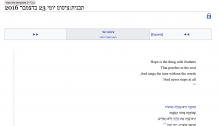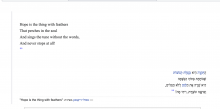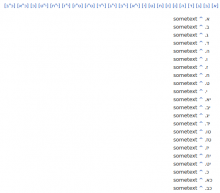We are currently in the process of removing legacy CSS from MediaWiki. In many cases this will significantly reduce the amount of CSS needed to render a MediaWiki page which will lead to better page load times, however may impact articles in one particular way.
If your wiki uses <div class="mw-content-ltr"> or <div class="mw-content-rtl"> without dir or lang attributes, these will currently not work in the Vector modern skin and will soon stop working in future in other skins without action.
''Why'' - this removes 2kb of CSS for every page view, a significant performance gain; it reduces maintenance burden on the engineers of skins; this has never worked on mobile versions of the site.
Action required by 12th August.
1) Check the impact on your wiki.
Go to yourwiki/w/index.php?title=Special:Search&search=insource%3A%2F\<div+class\%3D["']mw-content-(ltr|rtl)["']\>%2F&profile=advanced&fulltext=1&ns0=1&ns1=1&ns2=1&ns3=1&ns4=1&ns5=1&ns6=1&ns7=1&ns8=1&ns9=1&ns10=1&ns11=1&ns12=1&ns13=1&ns14=1&ns15=1&ns100=1&ns101=1
Check the results in the top right corner. If the number is significant (I would suggest. < 1000 may not be significant for guidance), you are impacted.
Also check templates:
Go to yourwiki/w/index.php?search=insource%3A%2F%5C%3Cdiv+class%5C%3D%5B%22%27%5Dmw-content-%28ltr%7Crtl%29%5B%22%27%5D%5C%3E%2F&title=Special:Search&profile=advanced&fulltext=1&ns10=1
Check that no widely used templates appear in that search result.
2) Understand the issue
Click one of the search results to the above query and view in Vector modern by adding the following query string parameter:
?useskin=vector&useskinversion=2
Content will appear in the wrong writing direction.
| Broken | With correct fix |
3) Fix the issue
Add the following rule to MediaWiki:Common.css (or MediaWiki:(Monobook|Vector).css` if preferred.
/* Short term fix for T287701. Please remove when all templates have `dir` attributes set. */ .mw-content-ltr { /* @noflip */ direction: ltr; } .mw-content-rtl { /* @noflip */ direction: rtl; }
4) Notify users that the dir attribute must be used going forward.
Make sure editors are updated on best practices for including content in a different language / direction and that failure to use them leads to rendering problems on mobile.
For example:
Correct:
<div class="mw-content-ltr" dir="ltr" lang="en">Today's featured article</div> <div class="mw-content-rtl" dir="rtl" lang="he">ערך מומלץ </div> <code class="mw-content-ltr" dir="ltr">...</code>
Incorrect:
<div class="mw-content-ltr">Today's featured article</div> <div class="mw-content-rtl">ערך מומלץ </div> <code class="mw-content-ltr">...</code>
Further action
Update mw:Directionality_support#Wiki_content documentation accordingly to clarify on dir preference.





